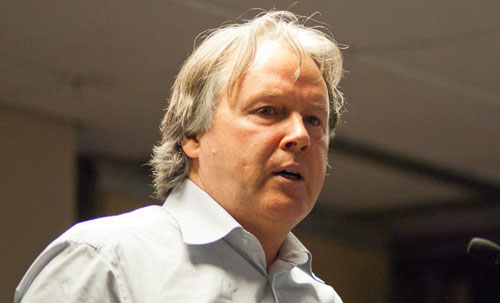
Matthew Fraser, a British-Canadian former journalist and now self-styled Web 2.0 strategist and new media expert, says that the world is living in a “reset economy” where the Internet and social media are “redefining how we manage people, market products and engage with politics”.
He says the “Holy Trinity” of modern capitalism — mass production (the top-down value chain), mass marketing (one-way advertising) and mass media (the “push” broadcast model) — is being toppled by social media.
Fraser says social media is driving “velocity” — how quickly new technology is adopted. “Using 150m units as the benchmark, it took the telephone 89 years to reach 150m, TV took 38 years, the cellphone took a mere 14, the iPod took half that at seven years, and Facebook took only five years to reach 150m.”
Fraser asks why businesses should be talking about social media. “The answer is simple: it’s because that’s where everybody is.”
He says social media “diffuses power from the centre to the edges and from management to users”.
“We are no longer just consumers, but also producers of information and knowledge. Information and communication is no longer top-down or a one-way push.”
This, he believes, has created a culture of sharing, but this culture hasn’t penetrated the way companies are run. He says that in the age of two-way communication, customers expect engagement from businesses.
“Coca-Cola’s Facebook page wasn’t created by the company,” says Fraser. He says the legal department advised Coca-Cola’s CEO to have it shut down after it reached 1m “likes”. The marketing department wanted to keep it running because it meant customers were doing communications on their behalf.
Fraser says social media brings down the barriers of entry for small companies, and possibilities of viral for marketing are often underestimated by companies and by politicians.
“There cannot be a large political campaign in a developed economy without social media since the [Barack] Obama [election] campaign,” he says.
Recruitment has also moved online. Most headhunting is now done via social media, Fraser says. Deloitte, for example, is rewarding employees for finding new talent via Facebook and LinkedIn.
The downside of social media is that it also provides prospective employers with information about candidates. “Chances are, if you apply for a job these days by the time you get to the interview you’ve been Googled and your social media presence has been examined.”
More than half of the Fortune 100 companies are using Facebook and Twitter to manage their brands and communicate with customers. Fraser says companies are beginning to embrace social media more intimately despite concerns about it undermining the traditional corporate top-down cultures and structures.
He says companies need to adapt to “millennials” — those born after 1980 — because they have new values and assumptions about how people interact in organisational environments. They value individual empowerment, collaboration and participation.
Fraser says products like Salesforce.com’s “Chatter” are good examples of the shift underway. “Intranets have become social, or need to do so, because increasingly people are viewing offices as social environments.”
But there’s a reality check coming, he says. Hierarchies persist because there is the idea that “there has to be a boss”. He says legal, human resources and IT departments are often the most opposed to embracing social media, though marketing and communications departments “love it”.
Fraser says managers need to realise the value of open, collaborative models of corporate culture and that they cannot control and manage reputation as they once did. “It’s very difficult to manage your brand unless you’re constantly engaging with your [customer] base.”
Companies, he adds, must come to terms with the fact that consumers, bloggers and even employees can enhance or detract from their reputation. Rather than object to this, they need to use reputation-tracking tools and embrace “constant learning”.
He says social media is hard to measure in terms of return on investment, which often puts companies off. “We need to think more in terms of return on information, not investment. Social media doesn’t replace your internal or external communications strategy, but it’s also not an add-on or ‘bauble’. Social media should be integrated into strategy. It has to become part of the DNA of your corporate culture.” — Craig Wilson, TechCentral
- Subscribe to our free daily newsletter
- Follow us on Twitter or on Facebook

